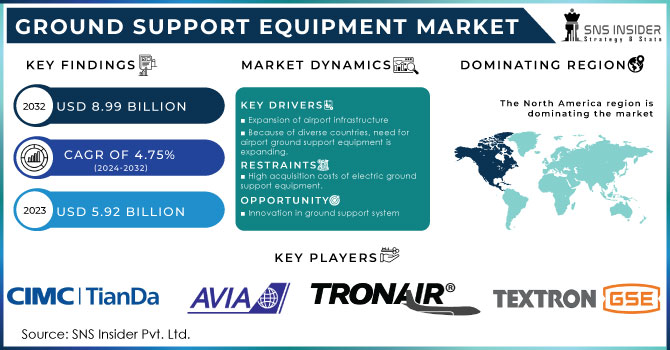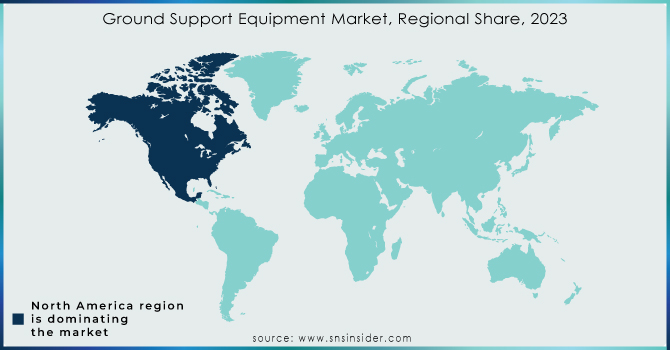Ground Support Equipment (GSE) Market Report Scope & Overview:

To get more information on Ground Support Equipment Market - Request Free Sample Report
The Ground Support Equipment Market Size was valued at US$ 5.92 billion in 2023 and is expected to reach USD 8.99 billion by 2032 with a growing CAGR of 4.75% over the forecast period 2024-2032.
Ground support equipment is designed to assist an aircraft's operations while it is at the airport. GSE includes airplane push-back and hook-up, forklifts and lifts, carts, cars, air-conditioning tugs, belt & container loaders, light-duty trucks, and other powering, towing, and servicing equipment. Furthermore, such equipment enables functions such as passenger handling, baggage handling, aircraft mobility, repair, servicing, and maintenance. Many airlines own/operate GSE or have full-service leasing from equipment management companies.
In addition, resources to achieve economic efficiency and growth of energy efficient equipment at airports to reduce noise pollution and Carbon Dioxide are two factors that enhance the Growth Market for Aviation Support Equipment in the current era. Currently, airports are increasing investment to reduce their operating time and increase efficiency. This step can improve efficiency by increasing profits and reducing maintenance costs. Therefore, airport authorities need to have proper support equipment. The International Airport Support Services Market is growing in a number of market segments. Among them, the GSE mobile component offers major benefits such as ease of use and timeliness, which is estimated to boost the growth of the International Airport Support Services Market during the study. The electrical component promotes high growth due to the operational requirements of the non-carbon aircraft and the increasing pressure on airport authorities in terms of tools. In addition, the aviation sector is driving market growth due to its airport support services, air traffic control, and increased passenger traffic. The mobile equipment segment is increasing its market capacity due to increased passenger management and aviation. In addition, the commercial airport segment is driving market growth due to the growing airport development in the developing economies of countries such as India and China due to the increase in flights, goods, and passenger travel.
MARKET DYNAMICS
KEY DRIVERS
-
Expansion of airport infrastructure
-
Because of diverse countries, need for airport ground support equipment is expanding.
RESTRAINTS
-
High acquisition costs of electric ground support equipment.
OPPORTUNITIES
-
Innovation in ground support system
CHALLENGES
-
Electric grids Overloading
IMPACT OF COVID-19
According to an analysis by Airport International Council (ACI), the impact of COVID-19 on airport business will lead to a decrease of passenger passengers by 58.4% by 2020 compared to 2019. The airport industry expects a reduction in revenue by 60% compared. on the proposed pre-COVID-19 base. Significant depletion of passenger and air traffic is expected to have a significant impact on the demand for heritage resources in the short term. Although orders are placed prior to the COVID-19 disaster, delays in delivery and installation of equipment will have a significant impact on the equipment supplier business. The distribution of COVID-19 in the US and EU is expected to have a negative impact due to the closure of production facilities. For example, GSE manufacturer Vestergaard Company, based in Denmark, reduced production speed after Easter 2020. Commercial bans and closures in major areas such as Australia, UK, India, Qatar, UAE, etc., are expected to significantly affect airport operations. Ramp machine operators are in a position to save money, as most of them work for rent. Ground workers, however, are expected to pay for ramps and office costs at airports. This is expected to have a negative impact in the short term. However, in the aftermath of the COVID-19 disaster, ground workers are expected to recover from the financial crisis once the airports become fully operational.
The ground support equipment market is divided into two types: mobile and fixed. The ground support equipment market's mobile GSE segment is expected to develop at the fastest CAGR by 2028. Mobile GSEs are critical in airport operations since they enable airlines to achieve On-time Performance. Freight/compartment loaders, push-back farm haulers, forklifts, holder bed carriers, stuff farm haulers, mass loaders or transports, lodge administration vehicles, boarding steps, latrine vehicles, traveler transports, deicers, airplane energizing trucks, versatile ground power units, and portable pre-molded air units are instances of portable GSE fragments. During the gauge time frame, the expansion in airplane developments and the quantity of air terminal improvement projects are probably going to help the development of the portable GSE area of the market. The ground support hardware market is partitioned into three classes in light of the force source: non-electric, electric, and crossover. The development of the non-electric portion of the market can be credited to ceaseless air terminal extensions and an expansion in the number of airplane developments in the Asia Pacific and the Middle East's rising economies. With cost being a critical hindrance to the reception of electric GSE, propels in diesel motors used in non-electric GSE vehicles like GPUs, energizing trucks, and pull and tow farm haulers have been made. These vehicles and gear give ideal execution to diminish discharges and further develop air quality for ground administration administrators and other air terminal staff.
The ground support hardware market has been partitioned into three sections in light of activity: ordinary/monitored, remotely worked, and independent. Ground hardware administrators run ordinary/monitored GSE, for example, ground power units, air beginning units, cooling units, things farm vehicles, freight loaders, traveler transports/transports, traveler flights of stairs, and consumable and latrine trucks. The expanded requirement for traditional/monitored GSE will be driven by expansions in air traffic, cargo transportation, and traveler travel.
KEY MARKET SEGMENTATION
By Power Source
-
Non-Electric
-
Electric
-
Hybrid
By Point of Sale
-
Equipment
-
Maintenance Services
By Type
-
Fixed
-
Mobile
By Application
-
Aircraft Handling
-
Cargo Handling
-
Passenger Handling
By Equipment
-
Assembly Tool
-
Movement Equipment
By End User
-
Military Airport
-
Commercial Airport
REGIONAL ANALYSIS
The North American region is expected to lead the ground-breaking machinery market during the forecast period. Investing in brownfield airport projects to modernize and upgrade North American airport infrastructure is boosting the growth of the groundwater machinery market in the region. There is a lot of pressure on airports and manufacturers of ground support equipment to reduce pollution. Several countries in the North American region have a zero-emissions policy, which has resulted in manufacturers of land-based equipment providing environmentally-friendly equipment and subsidiaries using environmentally friendly fuel. Due to the existence of a significant number of real parts manufacturers OCMs and manufacturers of real equipment OEMs such as JBT Aero-Tech and Tug Technologies Corporation, competition in the region is severe. At the time of predicting, ongoing contemporary systems at existing airports in the United States are predicted to fuel the expansion of the worldwide subsistence equipment market.

Need any customization research on Ground Support Equipment Market - Enquiry Now
REGIONAL COVEREGE:
-
North America
-
USA
-
Canada
-
Mexico
-
-
Europe
-
Germany
-
UK
-
France
-
Italy
-
Spain
-
The Netherlands
-
Rest of Europe
-
-
Asia-Pacific
-
Japan
-
south Korea
-
China
-
India
-
Australia
-
Rest of Asia-Pacific
-
-
The Middle East & Africa
-
Israel
-
UAE
-
South Africa
-
Rest of Middle East & Africa
-
-
Latin America
-
Brazil
-
Argentina
-
Rest of Latin America
-
KEY PLAYERS
The Major Players are Shenzhen CIMC-TianDa Airport Support Ltd., Avia Equipment Pte Ltd, Charlotte America, Tronair Inc., GATE GSE, JBT Corporation, Tex-tron Ground Support Equipment Inc., MULAG Fahrzeugwerk, Curtis Instruments, Inc., STANGCO Industrial Equipment, Inc. and Other Players
| Report Attributes | Details |
|---|---|
| Market Size in 2023 | US$ 5.92 Billion |
| Market Size by 2032 | US$ 8.99 Billion |
| CAGR | CAGR of 4.75% From 2024 to 2032 |
| Base Year | 2023 |
| Forecast Period | 2024-2032 |
| Historical Data | 2020-2022 |
| Report Scope & Coverage | Market Size, Segments Analysis, Competitive Landscape, Regional Analysis, DROC & SWOT Analysis, Forecast Outlook |
| Key Segments | • By Power Source (Non-Electric, Electric, Hybrid) • By Point of Sale (Equipment, Maintenance Services) • By Type (Fixed and Mobile) • By Application (Aircraft Handling, Cargo Handling, and Passenger Handling) • By Equipment (Assembly Tool and Movement Equipment) • By End User (Military Airport and Commercial Airport) |
| Regional Analysis/Coverage | North America (USA, Canada, Mexico), Europe (Germany, UK, France, Italy, Spain, Netherlands, Rest of Europe), Asia-Pacific (Japan, South Korea, China, India, Australia, Rest of Asia-Pacific), The Middle East & Africa (Israel, UAE, South Africa, Rest of Middle East & Africa), Latin America (Brazil, Argentina, Rest of Latin America) |
| Company Profiles | Shenzhen CIMC-TianDa Airport Support Ltd., Avia Equipment Pte Ltd, Charlotte America, Tronair Inc., GATE GSE, JBT Corporation, Tex-tron Ground Support Equipment Inc., MULAG Fahrzeugwerk, Curtis Instruments, Inc., STANGCO Industrial Equipment, Inc. |
| DRIVERS | • Expansion of airport infrastructure • Because of diverse countries, need for airport ground support equipment is expanding. |
| OPPORTUNITIES | • High acquisition costs of electric ground support equipment. |

